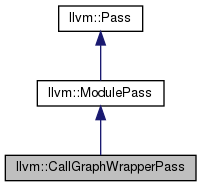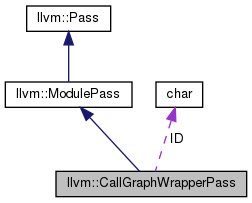The ModulePass which wraps up a CallGraph and the logic to build it.
More...
#include "llvm/Analysis/CallGraph.h"


Public Types | |
| using | iterator = CallGraph::iterator |
| using | const_iterator = CallGraph::const_iterator |
Public Member Functions | |
| CallGraphWrapperPass () | |
| ~CallGraphWrapperPass () override | |
| const CallGraph & | getCallGraph () const |
The internal CallGraph around which the rest of this interface is wrapped. More... | |
| CallGraph & | getCallGraph () |
| Module & | getModule () const |
| Returns the module the call graph corresponds to. More... | |
| iterator | begin () |
| iterator | end () |
| const_iterator | begin () const |
| const_iterator | end () const |
| const CallGraphNode * | operator[] (const Function *F) const |
| Returns the call graph node for the provided function. More... | |
| CallGraphNode * | operator[] (const Function *F) |
| Returns the call graph node for the provided function. More... | |
| CallGraphNode * | getExternalCallingNode () const |
Returns the CallGraphNode which is used to represent undetermined calls into the callgraph. More... | |
| CallGraphNode * | getCallsExternalNode () const |
| Function * | removeFunctionFromModule (CallGraphNode *CGN) |
| Unlink the function from this module, returning it. More... | |
| CallGraphNode * | getOrInsertFunction (const Function *F) |
Similar to operator[], but this will insert a new CallGraphNode for F if one does not already exist. More... | |
| void | getAnalysisUsage (AnalysisUsage &AU) const override |
| getAnalysisUsage - This function should be overriden by passes that need analysis information to do their job. More... | |
| bool | runOnModule (Module &M) override |
| runOnModule - Virtual method overriden by subclasses to process the module being operated on. More... | |
| void | releaseMemory () override |
| releaseMemory() - This member can be implemented by a pass if it wants to be able to release its memory when it is no longer needed. More... | |
| void | print (raw_ostream &o, const Module *) const override |
| print - Print out the internal state of the pass. More... | |
| void | dump () const |
 Public Member Functions inherited from llvm::ModulePass Public Member Functions inherited from llvm::ModulePass | |
| ModulePass (char &pid) | |
| ~ModulePass () override | |
| Pass * | createPrinterPass (raw_ostream &OS, const std::string &Banner) const override |
| createPrinterPass - Get a module printer pass. More... | |
| void | assignPassManager (PMStack &PMS, PassManagerType T) override |
| Find appropriate Module Pass Manager in the PM Stack and add self into that manager. More... | |
| PassManagerType | getPotentialPassManagerType () const override |
| Return what kind of Pass Manager can manage this pass. More... | |
 Public Member Functions inherited from llvm::Pass Public Member Functions inherited from llvm::Pass | |
| Pass (PassKind K, char &pid) | |
| Pass (const Pass &)=delete | |
| Pass & | operator= (const Pass &)=delete |
| virtual | ~Pass () |
| PassKind | getPassKind () const |
| virtual StringRef | getPassName () const |
| getPassName - Return a nice clean name for a pass. More... | |
| AnalysisID | getPassID () const |
| getPassID - Return the PassID number that corresponds to this pass. More... | |
| virtual bool | doInitialization (Module &) |
| doInitialization - Virtual method overridden by subclasses to do any necessary initialization before any pass is run. More... | |
| virtual bool | doFinalization (Module &) |
| doFinalization - Virtual method overriden by subclasses to do any necessary clean up after all passes have run. More... | |
| void | dump () const |
| virtual void | preparePassManager (PMStack &) |
| Check if available pass managers are suitable for this pass or not. More... | |
| void | setResolver (AnalysisResolver *AR) |
| AnalysisResolver * | getResolver () const |
| virtual void * | getAdjustedAnalysisPointer (AnalysisID ID) |
| getAdjustedAnalysisPointer - This method is used when a pass implements an analysis interface through multiple inheritance. More... | |
| virtual ImmutablePass * | getAsImmutablePass () |
| virtual PMDataManager * | getAsPMDataManager () |
| virtual void | verifyAnalysis () const |
| verifyAnalysis() - This member can be implemented by a analysis pass to check state of analysis information. More... | |
| virtual void | dumpPassStructure (unsigned Offset=0) |
| template<typename AnalysisType > | |
| AnalysisType * | getAnalysisIfAvailable () const |
| getAnalysisIfAvailable<AnalysisType>() - Subclasses use this function to get analysis information that might be around, for example to update it. More... | |
| bool | mustPreserveAnalysisID (char &AID) const |
| mustPreserveAnalysisID - This method serves the same function as getAnalysisIfAvailable, but works if you just have an AnalysisID. More... | |
| template<typename AnalysisType > | |
| AnalysisType & | getAnalysis () const |
| getAnalysis<AnalysisType>() - This function is used by subclasses to get to the analysis information that they claim to use by overriding the getAnalysisUsage function. More... | |
| template<typename AnalysisType > | |
| AnalysisType & | getAnalysis (Function &F) |
| getAnalysis<AnalysisType>() - This function is used by subclasses to get to the analysis information that they claim to use by overriding the getAnalysisUsage function. More... | |
| template<typename AnalysisType > | |
| AnalysisType & | getAnalysisID (AnalysisID PI) const |
| template<typename AnalysisType > | |
| AnalysisType & | getAnalysisID (AnalysisID PI, Function &F) |
Static Public Attributes | |
| static char | ID |
Additional Inherited Members | |
 Static Public Member Functions inherited from llvm::Pass Static Public Member Functions inherited from llvm::Pass | |
| static const PassInfo * | lookupPassInfo (const void *TI) |
| static const PassInfo * | lookupPassInfo (StringRef Arg) |
| static Pass * | createPass (AnalysisID ID) |
 Protected Member Functions inherited from llvm::ModulePass Protected Member Functions inherited from llvm::ModulePass | |
| bool | skipModule (Module &M) const |
| Optional passes call this function to check whether the pass should be skipped. More... | |
Detailed Description
The ModulePass which wraps up a CallGraph and the logic to build it.
This class exposes both the interface to the call graph container and the module pass which runs over a module of IR and produces the call graph. The call graph interface is entirelly a wrapper around a CallGraph object which is stored internally for each module.
Definition at line 324 of file CallGraph.h.
Member Typedef Documentation
◆ const_iterator
Definition at line 339 of file CallGraph.h.
◆ iterator
Definition at line 338 of file CallGraph.h.
Constructor & Destructor Documentation
◆ CallGraphWrapperPass()
| CallGraphWrapperPass::CallGraphWrapperPass | ( | ) |
Definition at line 262 of file CallGraph.cpp.
References llvm::PassRegistry::getPassRegistry(), llvm::initializeCallGraphWrapperPassPass(), and ~CallGraphWrapperPass().
◆ ~CallGraphWrapperPass()
|
overridedefault |
Referenced by CallGraphWrapperPass().
Member Function Documentation
◆ begin() [1/2]
|
inline |
Definition at line 344 of file CallGraph.h.
◆ begin() [2/2]
|
inline |
Definition at line 346 of file CallGraph.h.
◆ dump()
| LLVM_DUMP_METHOD void CallGraphWrapperPass::dump | ( | ) | const |
Definition at line 297 of file CallGraph.cpp.
References llvm::AnalysisUsage::addRequiredTransitive(), llvm::dbgs(), llvm::errs(), getAnalysisUsage(), llvm::PassRegistry::getPassRegistry(), ID, INITIALIZE_PASS_BEGIN(), INITIALIZE_PASS_DEPENDENCY, llvm::initializeCallGraphPrinterLegacyPassPass(), llvm::ModulePass::ModulePass(), print(), runOnModule(), and llvm::AnalysisUsage::setPreservesAll().
◆ end() [1/2]
|
inline |
Definition at line 345 of file CallGraph.h.
◆ end() [2/2]
|
inline |
Definition at line 347 of file CallGraph.h.
◆ getAnalysisUsage()
|
overridevirtual |
getAnalysisUsage - This function should be overriden by passes that need analysis information to do their job.
If a pass specifies that it uses a particular analysis result to this function, it can then use the getAnalysis<AnalysisType>() function, below.
Reimplemented from llvm::Pass.
Definition at line 268 of file CallGraph.cpp.
References llvm::AnalysisUsage::setPreservesAll().
Referenced by dump().
◆ getCallGraph() [1/2]
The internal CallGraph around which the rest of this interface is wrapped.
Definition at line 335 of file CallGraph.h.
References G.
Referenced by llvm::AnalysisCallGraphWrapperPassTraits::getGraph(), and llvm::InternalizePass::run().
◆ getCallGraph() [2/2]
|
inline |
Definition at line 336 of file CallGraph.h.
References G.
◆ getCallsExternalNode()
|
inline |
Definition at line 363 of file CallGraph.h.
◆ getExternalCallingNode()
|
inline |
Returns the CallGraphNode which is used to represent undetermined calls into the callgraph.
Definition at line 359 of file CallGraph.h.
◆ getModule()
|
inline |
Returns the module the call graph corresponds to.
Definition at line 342 of file CallGraph.h.
◆ getOrInsertFunction()
|
inline |
Similar to operator[], but this will insert a new CallGraphNode for F if one does not already exist.
Definition at line 384 of file CallGraph.h.
References llvm::CallGraph::dump(), and llvm::CallGraph::print().
◆ operator[]() [1/2]
|
inline |
Returns the call graph node for the provided function.
Definition at line 350 of file CallGraph.h.
References F().
◆ operator[]() [2/2]
|
inline |
Returns the call graph node for the provided function.
Definition at line 355 of file CallGraph.h.
References F().
◆ print()
|
overridevirtual |
print - Print out the internal state of the pass.
This is called by Analyze to print out the contents of an analysis. Otherwise it is not necessary to implement this method. Beware that the module pointer MAY be null. This automatically forwards to a virtual function that does not provide the Module* in case the analysis doesn't need it it can just be ignored.
Reimplemented from llvm::Pass.
Definition at line 285 of file CallGraph.cpp.
References LLVM_DUMP_METHOD.
Referenced by dump().
◆ releaseMemory()
|
overridevirtual |
releaseMemory() - This member can be implemented by a pass if it wants to be able to release its memory when it is no longer needed.
The default behavior of passes is to hold onto memory for the entire duration of their lifetime (which is the entire compile time). For pipelined passes, this is not a big deal because that memory gets recycled every time the pass is invoked on another program unit. For IP passes, it is more important to free memory when it is unused.
Optionally implement this function to release pass memory when it is no longer used.
Reimplemented from llvm::Pass.
Referenced by runOnModule().
◆ removeFunctionFromModule()
|
inline |
Unlink the function from this module, returning it.
Because this removes the function from the module, the call graph node is destroyed. This is only valid if the function does not call any other functions (ie, there are no edges in it's CGN). The easiest way to do this is to dropAllReferences before calling this.
Definition at line 378 of file CallGraph.h.
◆ runOnModule()
runOnModule - Virtual method overriden by subclasses to process the module being operated on.
Implements llvm::ModulePass.
Definition at line 272 of file CallGraph.cpp.
References ID, INITIALIZE_PASS, and releaseMemory().
Referenced by dump().
Member Data Documentation
◆ ID
|
static |
Definition at line 328 of file CallGraph.h.
Referenced by dump(), and runOnModule().
The documentation for this class was generated from the following files:
- include/llvm/Analysis/CallGraph.h
- lib/Analysis/CallGraph.cpp
 1.8.13
1.8.13